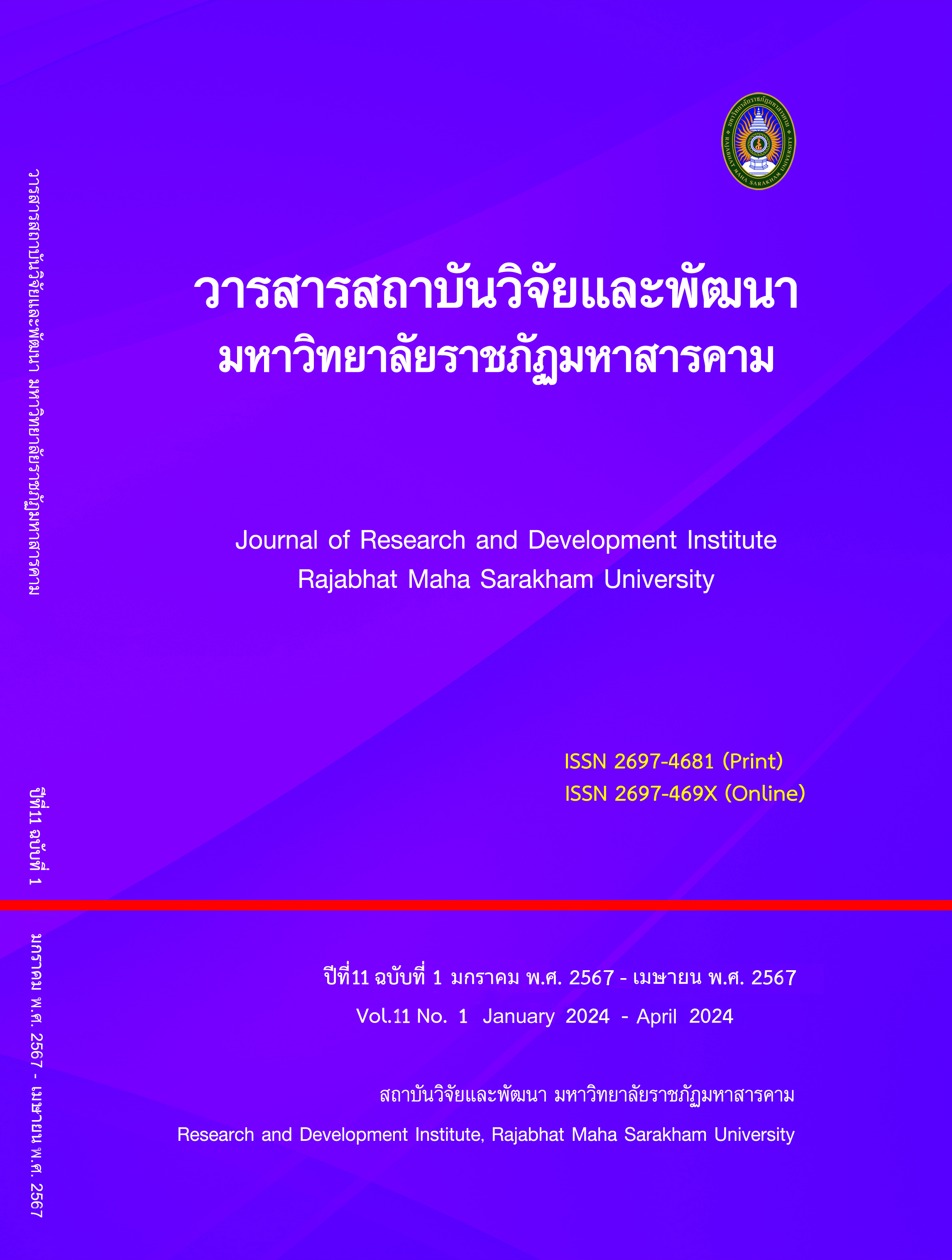The Development of Digital Technology Application Manual for Science Project-based Learning to the STEM Education Approach
Keywords:
Digital Technology Application Manual, Science Project-based Learning, STEM Education ApproachAbstract
This research aims to: 1). development of digital technology application manual for science project-based learning to the STEM education approach 2) ask expert opinions on the appropriateness of the digital technology application manual for science project-based learning to the STEM education approach 3) trial digital technology application manual for science project-based learning to the STEM education approach. The target audience consists of nine experts who have experience in digital technology application manual and the second group, 25 high school students who are members of the Science Club who choose to study in the field of minor inventors. The tools used in this study were a knowledge test observational form of learning behavior of learners desirable character behavior team work science project assessment form a questionnaire on student satisfaction with activities and manuals a satisfaction questionnaire for speakers and mentors, a form for assessing the appropriateness of the event process and the assessment form of the manual. The statistics used are as follows: percentage, average and standard deviation.
The results of this research were as follows: 1) Activity manual for speakers, mentors and learners, (1) Activity guide for speakers and mentors There are 3 parts in total as follows: Part 1 Introduction: presents the importance of applying digital technology. manual details Activities measurement and evaluation and learning management plans. Part 2 contents show information on 6 learning contents, knowledge sheets and activity sheets. learner There are 2 parts in total as follows: Part 1: Introduction: Shows important information about the application of digital technology. manual details Activities measurement and evaluation And the learning management plan and part 2, the content shows information showing the content of learning 6 units, knowledge sheets and activity sheets. 2) Experts have commented on the suitability of the digital technology application manual for science project-based learning to the STEM education approach. At the highest level. 3) The result of the activity guide trial showed that the learners had scores after the activity. higher than before the activity at the level of statistical significance The learners' learning outcomes according to the STEM education approach from the overall average activity sheet were at a high level. Teamwork evaluation results of learners were at the highest level. The result of the assessment of the student's behavior was between 90.00 - 100.00. The assessment of the science project was at a high level. student satisfaction The speakers and mentors who applied digital technology activities to support the development of STEM-based science projects were at the highest level.
References
Ananya Intharapak. (2015). Effects of using problem-solving multimedia lessons on the ability to solve math problems. of 5th grade elementary school students. Veridian E -Journal, 8(3), 478-493
Best, John. W. (1997). Research in Education. (3nd ed). Englewood Cliffs, NJ : Prentice-Hell.
Fioriello, P. (2016). Understanding the Basics of STEM Education. Available: http://drpfconsults.com/understanding-the-basics-of-stem-education
Kotano, W. (2012). Organizing learning activities. To develop the ability to think critically and academic achievement of students by using the KWL Plus Learning Model in Social Studies. For students in grade 1 Rong Kham School. Khon Kaen : Khon Kaen University.
Ministry of Education. (2010). Basic Education Core Curriculum 2008. Bangkok : Agricultural Cooperatives Association of Thailand.
Office of the Secretariat of the Education Council. (2010). Proposals for educational reform in the second decade (2009 - 2018). Bangkok : Phrikwan Graphics Co., Ltd.
Watchara Laoriandee. (2017). Proactive learning strategies to develop thinking and raise the quality of education for the 21st century. Nakhon Pathom : Petchkasem Printing Group.
Wattana Mangkhasaman. (2011). Project-based teaching. (3rd printing). Bangkok : Chulalongkorn University Press.
Wicharn Panich. (2012). Ways to create learning for students in the 21st century. Bangkok : Sodsri-Saritwong Foundation.
Downloads
Published
How to Cite
Issue
Section
License
Copyright (c) 2024 กฤตนัย ล้ำจุมจัง, อภิชาติ เหล็กดี, ธรัช ธรัช

This work is licensed under a Creative Commons Attribution-NonCommercial-NoDerivatives 4.0 International License.
Articles that are published are copyrighted by the authors of the articles







